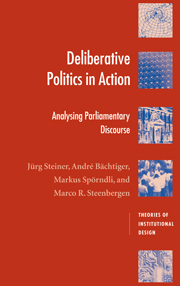Book contents
- Frontmatter
- Contents
- Acknowledgments
- Introduction: The research questions
- 1 Institutions and behavior: the example of consociational theory
- 2 The philosophical literature on deliberative politics
- 3 Measuring deliberation: a Discourse Quality Index
- 4 Understanding the real world of deliberation: hypotheses about antecedents and consequences
- 5 Antecedents of deliberation: institutions and issues
- 6 Discourse and its consequences
- Conclusion and research outlook
- Appendix: Discourse Quality Index (DQI): instructions for coders
- References
- Index
1 - Institutions and behavior: the example of consociational theory
Published online by Cambridge University Press: 22 September 2009
- Frontmatter
- Contents
- Acknowledgments
- Introduction: The research questions
- 1 Institutions and behavior: the example of consociational theory
- 2 The philosophical literature on deliberative politics
- 3 Measuring deliberation: a Discourse Quality Index
- 4 Understanding the real world of deliberation: hypotheses about antecedents and consequences
- 5 Antecedents of deliberation: institutions and issues
- 6 Discourse and its consequences
- Conclusion and research outlook
- Appendix: Discourse Quality Index (DQI): instructions for coders
- References
- Index
Summary
In its intellectual history, this book evolved from an interest in consociational theory and an increasing dissatisfaction with the integration of the behavior aspect into the theory. As consociational theory moved from studies of single countries like the Netherlands, Belgium, Switzerland, and Austria to the analysis of a large number of countries all over the world, the emphasis shifted increasingly to the institutional aspect. How political actors interact and speak with each other in consociational institutions was more and more neglected. In this opening chapter we use consociational theory as an illustration to show how the culture of how politicians interact and speak with each other is an important element that must be integrated into any institutional theory. Our basic argument is that speech is not cheap but may very well matter in many important theoretical ways (Noel 1990).
While we illustrate this argument for consociational theory, it also applies to other institutional theories. As we discuss in greater detail in chapter 4, much institutional research to date draws on two intellectual traditions. On the one hand, rational choice theories typically focus on a logic of consequentialism, which assumes that political actors seek the most efficient means to desired ends (Risse 2000). Institutional rules and structures are formulated to aid in this process. On the other hand, sociological theories frequently postulate a logic of appropriateness. In this view, institutions create behavioral norms that guide the actions of politicians (Risse 2000).
- Type
- Chapter
- Information
- Deliberative Politics in ActionAnalyzing Parliamentary Discourse, pp. 8 - 15Publisher: Cambridge University PressPrint publication year: 2005



